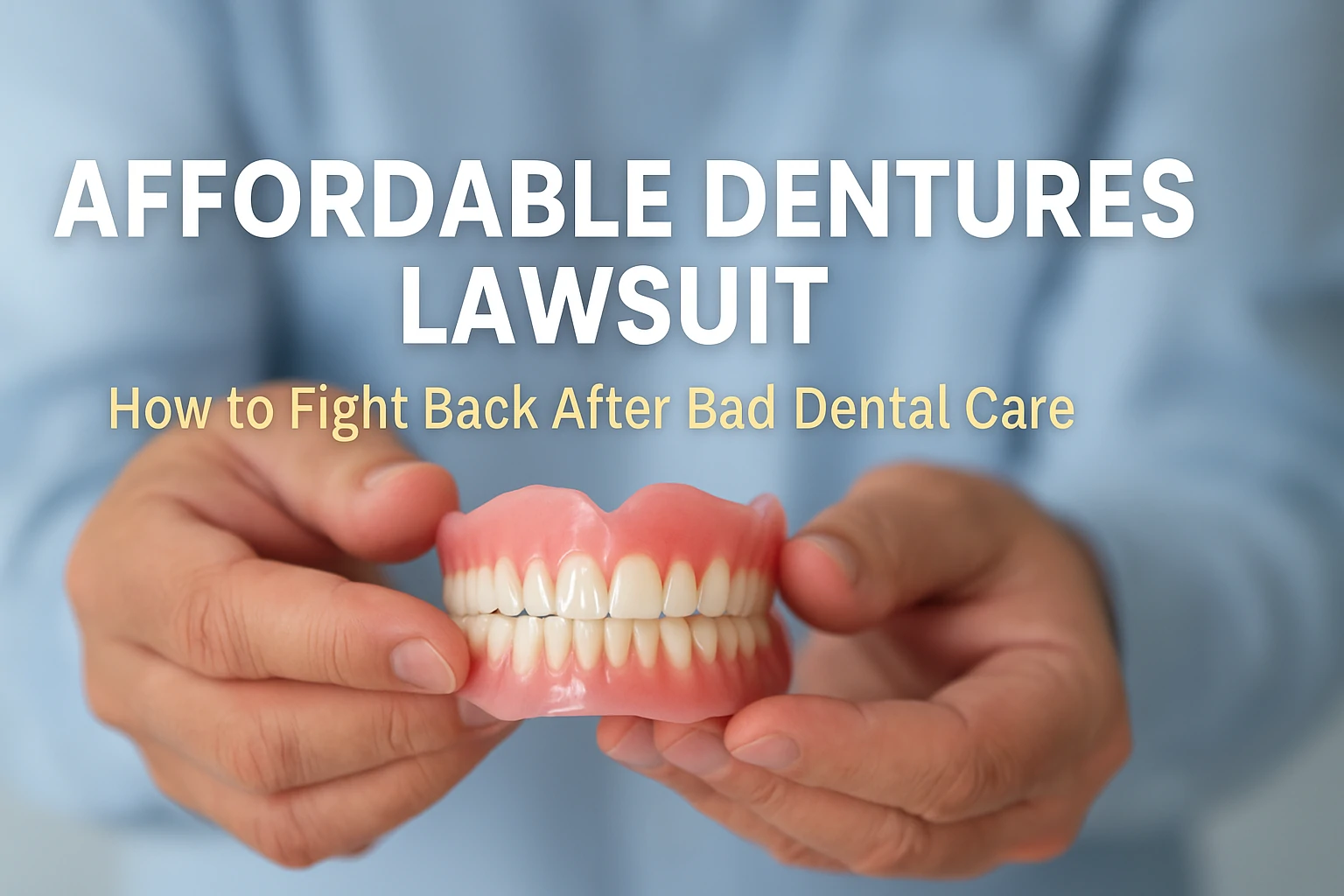Tooth loss affects more than your mouth. It changes how you eat, speak, and live. Many people choose dentures to fix the problem. They want comfort, confidence, and a better life. They turn to dental clinics with hope. One well-known chain, Affordable Dentures & Implants, claims to offer fast help at a low price. It runs clinics across many states. Its ads promise savings and quick care. This attracts people who need dental work but cannot afford high fees.
But not every visit ends well. Some patients say the clinic made things worse. They came in with hope but left with pain, damage, or useless dentures. Many now say the care was rushed, careless, or unsafe. Some lost money. Others suffered physical harm. These patients now speak out. Some take legal action. They claim the company did not follow basic rules. They feel misled, hurt, and ignored.
This article looks at what went wrong. It breaks down the lawsuits, the reasons behind them, and what others can do if they face the same harm. If you had a bad result at a clinic like this, you may have legal rights. This guide helps you understand the steps ahead.
What Went Wrong for Patients?
Many patients say the dental work they received was unsafe or careless. Some got dentures that did not fit their mouths. The dentures caused cuts, sores, or bleeding. Others say the implants became loose or infected soon after treatment. In some cases, people had to seek help from other dentists to fix the damage. That added to the cost and pain.
A few patients claim they never saw a real dentist. They believe a dental assistant or unlicensed staff member handled their procedure. Some say they were rushed through appointments without full exams or X-rays. They never got a clear explanation of risks or choices. They signed papers and sat in the chair, not knowing what could go wrong.
Other complaints focus on broken promises. Some patients say the clinic refused refunds after poor results. Some tried to call or return for help but were ignored or turned away. They were left with damaged teeth, bad dentures, and no support.
These are not just small issues. They affect health, confidence, and daily life. Chewing becomes hard. Smiles fade. Trust in dental care disappears. That is why people are turning to lawyers.
Real People Share Their Stories
In state after state, patients tell similar stories. One woman in Florida got full upper and lower dentures from an Affordable Dentures office. She says they did not fit and cut into her gums. Her mouth bled each time she tried to eat. She returned to the office, but staff told her the pain was normal. After several visits and no solution, she gave up and went to a new dentist. That dentist removed part of the denture and said it never should have been made that way.
Legal Grounds for the Lawsuit
When dental care causes harm, the law gives patients a way to respond. Many lawsuits against Affordable Dentures claim medical malpractice. That means the dentist failed to follow safe care rules. If a patient suffers because of that failure, the dentist may be held responsible.
Other lawsuits claim negligence. This means the clinic acted carelessly or allowed unqualified staff to handle treatments. Some lawsuits focus on breach of contract. The patient paid for a service, but the clinic did not deliver what it promised.
In more serious cases, patients claim consumer fraud. They say the clinic made false claims in ads or pushed treatment without full consent. In a few claims, patients say the dentures themselves were defective, which may fall under product liability law.
Each lawsuit begins with the facts. The court reviews what happened and how the patient was hurt. It also reviews what the clinic did or failed to do. If the clinic broke the rules or acted with neglect, the court may hold it responsible. The patient may receive money to cover the harm. This can include costs, pain, or losses caused by the poor care.
You can also read about a recent major case in this lawsuit against a Florida hospital.
What Patients Hope to Gain
People sue when they feel cheated or harmed. They paid for dental work that failed. The results did not match what the clinic promised. Now they deal with pain, extra bills, and stress. A lawsuit gives them a way to fight back. It can help them get money to cover their losses. It can also bring some peace after a hard experience.
Some patients ask for a refund. The treatment failed, and they want their money back. Others need help paying for new dental work. A few need surgery to fix the damage. That costs a lot. Some ask for money to cover pain, missed work, or stress. In serious cases, lawsuits ask the court to punish the clinic. That can happen if the clinic acted in a false or harmful way.
But money is not the only goal. Many patients want the company to change. They want staff trained better. They want honest answers and clear consent before treatment starts. They want the clinic to take patient care seriously. Lawsuits may push those changes forward.
How to Start a Claim
If a dental clinic caused you harm, you have the right to act. Start by collecting proof. Keep your receipts, emails, and photos. Save all papers from the clinic. Write down what took place. Include names, dates, and details. If you saw another dentist, keep those records as well.
Next, talk to a dental malpractice lawyer. Many lawyers give free consultations. You can share your story and ask questions. The lawyer will explain your rights. Most work on a “no win, no fee” plan. That means you pay nothing unless you win.
Your lawyer will handle the legal steps. They will file the case and gather more proof. They will talk to the clinic on your behalf. Some cases settle early. That means you may get money without going to court. If no deal happens, the case may go to trial. That process takes time, but your lawyer will stay with you the whole way.
Class Action vs. Individual Lawsuits
Some people choose to join a class action case. This happens when many people suffer the same type of harm. They come together and file one case as a group. If the court rules in their favor, each person may receive a share of the outcome. Class actions help when the problem affects large numbers of people in a similar way.
Not every case fits this path. If your harm is more serious or different from others, a personal lawsuit may work better. That gives you more control over your case. You may also receive a larger outcome based on your own loss. A lawyer can help you decide which choice is best.
No matter which path you take, you have rights. If you were hurt, you can speak up. The law protects people like you. You do not have to stay quiet. You can seek justice and take action.
What to Do Right Now
If you think you were harmed, act fast. Time limits apply in many states. They may limit how long you have to file a claim.
Start by visiting a trusted dentist. Get a second opinion. Ask what went wrong. Document the damage and save all records. Then talk to a lawyer. Ask questions and learn your options.
Stop using painful or unsafe dentures. Do not wait for the clinic to respond. Take control of your care and your future. The sooner you act, the better your chance of a strong case.
Conclusion
Dental care should heal, not hurt. Patients go to clinics with hope. They want to eat without pain, smile with pride, and feel whole again. They trust the staff to give safe, honest care. That trust matters. When it breaks, the damage runs deep.
The lawsuits against Affordable Dentures show how trust can fail. Many patients paid for care they never received. Some left in worse shape than when they arrived. They suffered pain, stress, and loss. Their health, time, and money were all affected. In many cases, no one took responsibility. That made the harm even harder to bear.
You do not have to stay quiet. You do not have to go through this on your own. Help exists. You have the right to speak. You have the right to take action. Your experience matters. You deserve care, truth, and fairness.
Start now. Talk to a lawyer who understands your rights. Ask what you should do next. Get honest answers. Learn how to protect your health and your future. Stand firm. Do not let fear stop you. Speak up. Defend your body, your time, and your money. You have the right to fair care. Your voice counts. Your story can bring change. You deserve respect. You deserve justice.
You may also be interested in the Victoria Bogner/Allworth lawsuit.
Common Questions Answered
Q. What is the main reason people sue Affordable Dentures?
Many patients say the dental work caused pain, harm, or failed results. They claim the clinic did not follow proper care standards. Some report broken dentures, infections, or work done without full consent.
Q. Can you take legal action if you signed a consent form?
Signing a form does not give a clinic the right to cause harm. If the care was careless or unsafe, you can still file a lawsuit. A lawyer can look at the facts and explain your options.
Q. How much time do you have to file a lawsuit?
Every state sets a time limit for legal claims. This is called the statute of limitations. Some states allow two years. Others allow more or less. It is best to act fast and speak to a lawyer right away.
Q. Do you need a lot of money to sue?
Most dental malpractice lawyers work on a “no win, no fee” plan. That means you do not pay unless you win. Many also offer a free first meeting to review your case.
Q. Can you join a lawsuit with other people?
If many people face the same problem, a class action may be possible. A lawyer can help decide if your case fits that type. If your harm is unique or severe, your own case may be better.
Q. What kind of proof do you need for a claim?
You need records, photos, receipts, and notes. Save emails and papers from the clinic. Keep records from any new dentist who helped you fix the damage. The more proof you have, the stronger your case will be.
Q. What can you get from a lawsuit?
You may recover the money you spent. You may also get payment for pain, stress, or new dental care. In some cases, courts may award more if the clinic acted in a harmful way.
Disclaimer
This article is for general information only. It does not give legal advice. If you need help with a legal issue, speak to a licensed attorney. Each case is different. Only a lawyer can give advice based on your situation.




